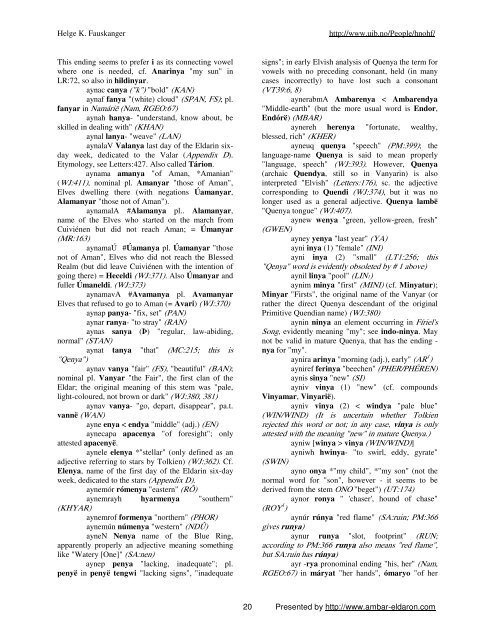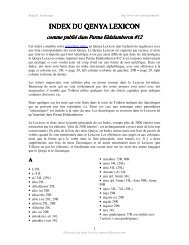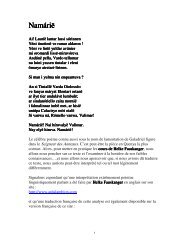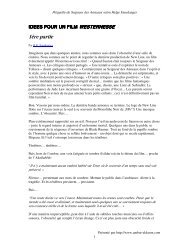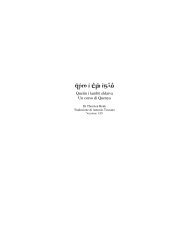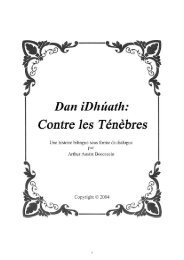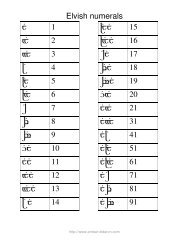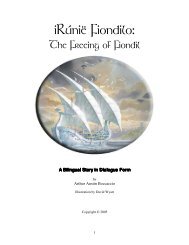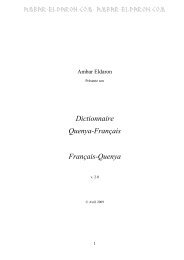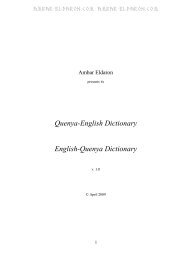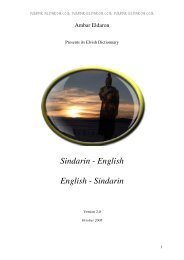Quenya Reverse Wordlist - Ambar Eldaron
Quenya Reverse Wordlist - Ambar Eldaron
Quenya Reverse Wordlist - Ambar Eldaron
You also want an ePaper? Increase the reach of your titles
YUMPU automatically turns print PDFs into web optimized ePapers that Google loves.
Helge K. Fauskanger http://www.uib.no/People/hnohf/<br />
This ending seems to prefer i as its connecting vowel<br />
where one is needed, cf. Anarinya "my sun" in<br />
LR:72, so also in hildinyar.<br />
aynac canya ("k") "bold" (KAN)<br />
aynaf fanya "(white) cloud" (SPAN, FS); pl.<br />
fanyar in Namárië (Nam, RGEO:67)<br />
aynah hanya- "understand, know about, be<br />
skilled in dealing with" (KHAN)<br />
aynal lanya- "weave" (LAN)<br />
aynalaV Valanya last day of the Eldarin sixday<br />
week, dedicated to the Valar (Appendix D).<br />
Etymology, see Letters:427. Also called Tárion.<br />
aynama amanya "of Aman, *Amanian"<br />
(WJ:411), nominal pl. Amanyar "those of Aman",<br />
Elves dwelling there (with negations Úamanyar,<br />
Alamanyar "those not of Aman").<br />
aynamalA #Alamanya pl.. Alamanyar,<br />
name of the Elves who started on the march from<br />
Cuiviénen but did not reach Aman; = Úmanyar<br />
(MR:163)<br />
aynamaÚ #Úamanya pl. Úamanyar "those<br />
not of Aman", Elves who did not reach the Blessed<br />
Realm (but did leave Cuiviénen with the intention of<br />
going there) = Heceldi (WJ:371). Also Úmanyar and<br />
fuller Úmaneldi. (WJ:373)<br />
aynamavA #Avamanya pl. Avamanyar<br />
Elves that refused to go to Aman (= Avari) (WJ:370)<br />
aynap panya- "fix, set" (PAN)<br />
aynar ranya- "to stray" (RAN)<br />
aynas sanya (Þ) "regular, law-abiding,<br />
normal" (STAN)<br />
aynat tanya "that" (MC:215; this is<br />
"Qenya")<br />
aynav vanya "fair" (FS), "beautiful" (BAN);<br />
nominal pl. Vanyar "the Fair", the first clan of the<br />
Eldar; the original meaning of this stem was "pale,<br />
light-coloured, not brown or dark" (WJ:380, 381)<br />
aynav vanya- "go, depart, disappear", pa.t.<br />
vannë (WAN)<br />
ayne enya < endya "middle" (adj.) (EN)<br />
aynecapa apacenya "of foresight"; only<br />
attested apacenyë.<br />
aynele elenya *"stellar" (only defined as an<br />
adjective referring to stars by Tolkien) (WJ:362). Cf.<br />
Elenya, name of the first day of the Eldarin six-day<br />
week, dedicated to the stars (Appendix D).<br />
aynemór rómenya "eastern" (RÔ)<br />
aynemrayh hyarmenya "southern"<br />
(KHYAR)<br />
aynemrof formenya "northern" (PHOR)<br />
aynemún númenya "western" (NDÛ)<br />
ayneN Nenya name of the Blue Ring,<br />
apparently properly an adjective meaning something<br />
like "Watery [One]" (SA:nen)<br />
aynep penya "lacking, inadequate"; pl.<br />
penyë in penyë tengwi "lacking signs", "inadequate<br />
20<br />
signs"; in early Elvish analysis of <strong>Quenya</strong> the term for<br />
vowels with no preceding consonant, held (in many<br />
cases incorrectly) to have lost such a consonant<br />
(VT39:6, 8)<br />
aynerabmA <strong>Ambar</strong>enya < <strong>Ambar</strong>endya<br />
"Middle-earth" (but the more usual word is Endor,<br />
Endórë) (MBAR)<br />
aynereh herenya "fortunate, wealthy,<br />
blessed, rich" (KHER)<br />
ayneuq quenya "speech" (PM:399); the<br />
language-name <strong>Quenya</strong> is said to mean properly<br />
"language, speech" (WJ:393). However, <strong>Quenya</strong><br />
(archaic Quendya, still so in Vanyarin) is also<br />
interpreted "Elvish" (Letters:176), sc. the adjective<br />
corresponding to Quendi (WJ:374), but it was no<br />
longer used as a general adjective. <strong>Quenya</strong> lambë<br />
"<strong>Quenya</strong> tongue" (WJ:407).<br />
aynew wenya "green, yellow-green, fresh"<br />
(GWEN)<br />
ayney yenya "last year" (YA)<br />
ayni inya (1) "female" (INI)<br />
ayni inya (2) "small" (LT1:256; this<br />
"Qenya" word is evidently obsoleted by # 1 above)<br />
aynil linya "pool" (LIN1)<br />
aynim minya "first" (MINI) (cf. Minyatur);<br />
Minyar "Firsts", the original name of the Vanyar (or<br />
rather the direct <strong>Quenya</strong> descendant of the original<br />
Primitive Quendian name) (WJ:380)<br />
aynin ninya an element occurring in Fíriel's<br />
Song, evidently meaning "my"; see indo-ninya. May<br />
not be valid in mature <strong>Quenya</strong>, that has the ending -<br />
nya for "my".<br />
aynira arinya "morning (adj.), early" (AR 1 )<br />
ayniref ferinya "beechen" (PHER/PHÉREN)<br />
aynis sinya "new" (SI)<br />
ayniv vinya (1) "new" (cf. compounds<br />
Vinyamar, Vinyarië).<br />
ayniv vinya (2) < windya "pale blue"<br />
(WIN/WIND) (It is uncertain whether Tolkien<br />
rejected this word or not; in any case, vinya is only<br />
attested with the meaning "new" in mature <strong>Quenya</strong>.)<br />
ayniw [winya > vinya (WIN/WIND)]<br />
ayniwh hwinya- "to swirl, eddy, gyrate"<br />
(SWIN)<br />
ayno onya *"my child", *"my son" (not the<br />
normal word for "son", however - it seems to be<br />
derived from the stem ONO "beget") (UT:174)<br />
aynor ronya " 'chaser', hound of chase"<br />
(ROY 1 )<br />
aynúr rúnya "red flame" (SA:ruin; PM:366<br />
gives runya)<br />
aynur runya "slot, footprint" (RUN;<br />
according to PM:366 runya also means "red flame",<br />
but SA:ruin has rúnya)<br />
ayr -rya pronominal ending "his, her" (Nam,<br />
RGEO:67) in máryat "her hands", ómaryo "of her<br />
Presented by http://www.ambar-eldaron.com


